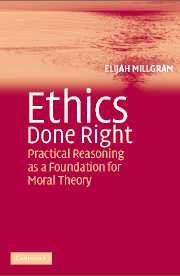Book contents
- Frontmatter
- Contents
- Acknowledgments
- Miscellaneous Frontmatter
- Introduction: The Method of Practical Reasoning
- 1 What's the Use of Utility?
- 2 Mill's Proof of the Principle of Utility
- 3 Does the Categorical Imperative Give Rise to a Contradiction in the Will?
- 4 Reasonably Virtuous
- 5 Murdoch, Practical Reasoning, and Particularism
- 6 Was Hume a Humean?
- 7 Hume on “Is” and “Ought”
- 8 Hume, Political Noncognitivism, and the History of England
- 9 Incommensurability and Practical Reasoning
- 10 Commensurability in Perspective
- 11 Varieties of Practical Reasoning and Varieties of Moral Theory
- References
- Index
5 - Murdoch, Practical Reasoning, and Particularism
Published online by Cambridge University Press: 12 November 2009
- Frontmatter
- Contents
- Acknowledgments
- Miscellaneous Frontmatter
- Introduction: The Method of Practical Reasoning
- 1 What's the Use of Utility?
- 2 Mill's Proof of the Principle of Utility
- 3 Does the Categorical Imperative Give Rise to a Contradiction in the Will?
- 4 Reasonably Virtuous
- 5 Murdoch, Practical Reasoning, and Particularism
- 6 Was Hume a Humean?
- 7 Hume on “Is” and “Ought”
- 8 Hume, Political Noncognitivism, and the History of England
- 9 Incommensurability and Practical Reasoning
- 10 Commensurability in Perspective
- 11 Varieties of Practical Reasoning and Varieties of Moral Theory
- References
- Index
Summary
Particularism is a contemporary movement in moral philosophy that it is hard to know what to do with. On the one hand, it's hard to dismiss. Its ranks include respectable – even prominent – authors such as Jonathan Dancy, Margaret Little, John McDowell, David McNaughton and Richard Norman. It purports to occupy one of the two extreme positions on the spectrum of views about the generality of reasons for action, and is worth a close look just for that. And it refuses to go away: particularism is the current incarnation of what used to be called “situationism” or “situation ethics,” which means that it has been around for a while. Philosophical views that stick around usually have something to them, and one is ill-advised to write them off without further ado. On the other hand, much of what is said on its behalf is either difficult to believe, or looks to be a philosophical dead end. And the view is faced with objections and difficulties – old objections, which for the most part one can find fielded against situationism – to which it seems to have no satisfactory response.
I want to suggest here that particularism would benefit from renewing its connection to the work of Iris Murdoch. I am going to recommend Murdoch's understanding of practical reasoning as a useful philosophical frame for what I will claim is the most important shared element of the particularist family of positions. In doing so, I mean to be encouraging those who work in the philosophical subspecialty of practical reasoning to add Murdoch's take on it to the contemporary menu of competing accounts.
- Type
- Chapter
- Information
- Ethics Done RightPractical Reasoning as a Foundation for Moral Theory, pp. 168 - 197Publisher: Cambridge University PressPrint publication year: 2005



